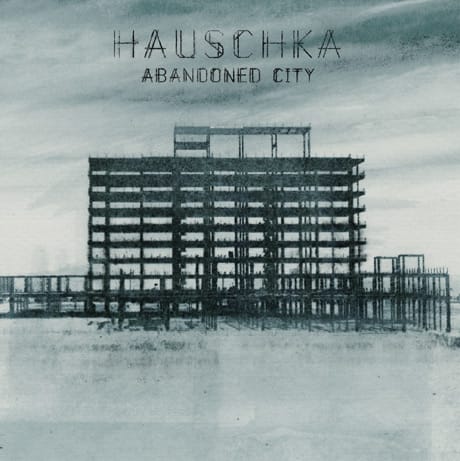Under the name Hauschka, Volker Bertelmann has been working at his prepared piano thing for over a decade now. While he began humbly with a solo-based approach, his works have expanded in scope and ambition in recent years. San Francisco's Magik*Magik Orchestra brought his lush string pieces to life on Foreign Landscapes of 2010, Samuli Kosminen (múm) and Calexico's Joey Burns and John Convertino helped develop the acoustic-electronic whimsy of 2011's Salon des Amateurs and the legendary Deutsche Grammophon released a full-length collaboration with Grammy-winning violinist Hilary Hahn in 2012. With Bertelmann again rocking a solo prepared piano, Abandoned City brings things back to the beginning.
The title of the album, Abandoned City, is also its theme. Most of the track names refer to ghost towns and projects that were deserted for various reasons ("Pripyat" being the city evacuated after the Chernobyl meltdown, "Sanzhi Pod City" being a failed UFO-style housing project from the late '70s, "Stromness" being a former whaling station that closed in 1961, etc). When one looks at pictures of these places, to see the devastation of formerly loved items, dwellings, schools and stadiums reduced to kipple, it's hard not to mourn the hopes and dreams of people who used to live and work there, yet also marvel at the haunting beauty that occurs in the reclamation of those locales by nature.
Patterns and juxtapositions immerge in the erosion. The corporeal nature of our existence appears obvious; we see that everything humanity has ever made is destined to be washed away by the earth's cycles, reabsorbed by the same entity that birthed it all. There is comfort in the dependability of those cycles, alongside the feeling that we all are so very small in the grand scheme of things.
To reflect the lonely happiness that one feels in those surroundings was Bertelmann's intention on Abandoned City. The album has an ominous, dramatic feel throughout. Triggering delay, distortion, echo as he mixed on the fly, Bertelmann's prepared piano (i.e. attaching paper and drumsticks to the strings) expanded the timbral range of the instrument to include the astounding sounds of percussion, harp, balafon and melodica, while maintaining the melodic prowess of his right hand. His piano sounds positively post-apocalyptic, while his melodies allude to the tension and humbling awe of his inspiration. While being one of the most serious Hauschka albums yet, Bertelmann still managed to produce an album of experimental music that you could dance to, if you weren't too busy having your mind blown.
(Temporary Residence)The title of the album, Abandoned City, is also its theme. Most of the track names refer to ghost towns and projects that were deserted for various reasons ("Pripyat" being the city evacuated after the Chernobyl meltdown, "Sanzhi Pod City" being a failed UFO-style housing project from the late '70s, "Stromness" being a former whaling station that closed in 1961, etc). When one looks at pictures of these places, to see the devastation of formerly loved items, dwellings, schools and stadiums reduced to kipple, it's hard not to mourn the hopes and dreams of people who used to live and work there, yet also marvel at the haunting beauty that occurs in the reclamation of those locales by nature.
Patterns and juxtapositions immerge in the erosion. The corporeal nature of our existence appears obvious; we see that everything humanity has ever made is destined to be washed away by the earth's cycles, reabsorbed by the same entity that birthed it all. There is comfort in the dependability of those cycles, alongside the feeling that we all are so very small in the grand scheme of things.
To reflect the lonely happiness that one feels in those surroundings was Bertelmann's intention on Abandoned City. The album has an ominous, dramatic feel throughout. Triggering delay, distortion, echo as he mixed on the fly, Bertelmann's prepared piano (i.e. attaching paper and drumsticks to the strings) expanded the timbral range of the instrument to include the astounding sounds of percussion, harp, balafon and melodica, while maintaining the melodic prowess of his right hand. His piano sounds positively post-apocalyptic, while his melodies allude to the tension and humbling awe of his inspiration. While being one of the most serious Hauschka albums yet, Bertelmann still managed to produce an album of experimental music that you could dance to, if you weren't too busy having your mind blown.
